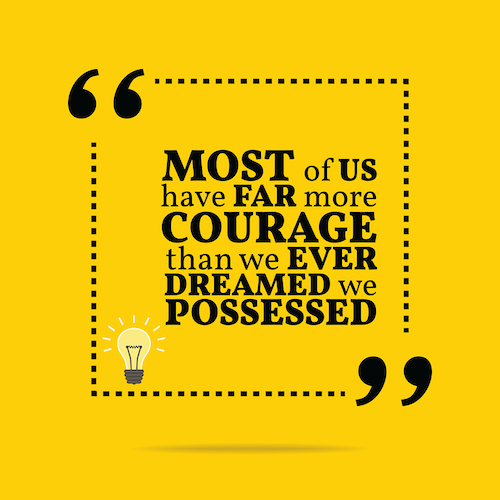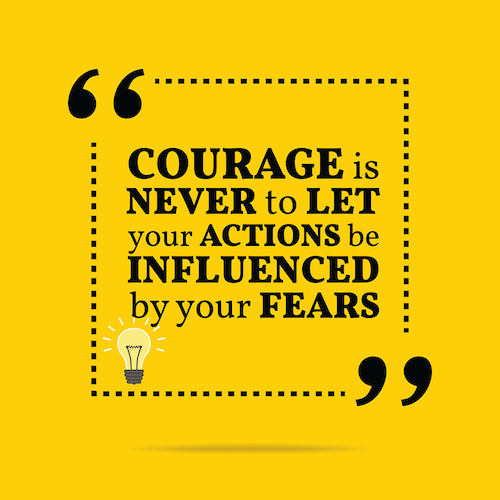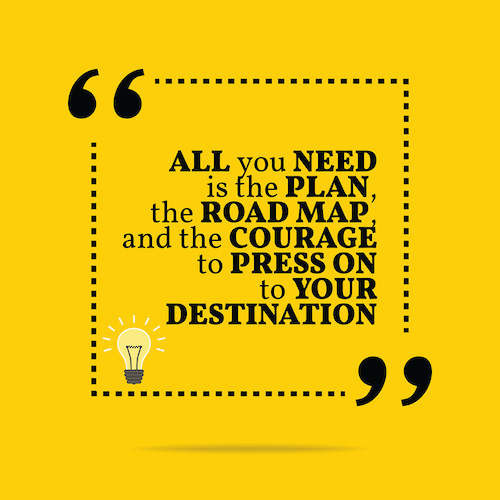Why All Co-Teachers Need Moral Courage
 The theme of moral courage has been a recurring preoccupation of mine for the past many weeks – years – even decades.
The theme of moral courage has been a recurring preoccupation of mine for the past many weeks – years – even decades.
But only recently, during my participation in a Fireside Chat at Molloy College, did I come across language that truly clarified for me what moral courage really is.
As readers of this blog have probably detected, I have been on a mission – searching for the common thread that is present in any (yes, any!) effective co-teaching relationship.
If you read through the archives of my blog, you will find the understood necessary ingredients for co-teaching effectiveness. These ingredients include ongoing communication, trust, respect, and positivity. Yet, my recent reflections go much deeper…into the very core of human nature. I feel like the very essence of effective co-teaching has been revealed!
Effective educators have moral courage
At this Fireside Chat, the idea of moral courage was well expressed as a necessary characteristic for an effective educational leader by Jamaal Bowman, Founding Principal of Cornerstone Academy for Social Action and Tom McGuire of the Principal Residency Network.
The speakers sparked our thinking around the topic Reimagining School: Adversity or Opportunity? McGuire and Bowman expanded our social awareness by helping us gain a clearer understanding of how moral courage connects to social justice, citizenship, and the depths of human nature.
For purposes of this post, I want to apply what I learned to co-teaching and consider why co-teachers must exude moral courage to co-create effective co-teaching experiences.
Come with me…I’ll show you what I mean….
What do we understand moral courage to be?
Before going any further, let’s get on the same page and share an understanding of moral courage. What is it anyway? Here are some possible responses from you. Yes, I know…I’m taking a shot in the dark here – attempting to actually read your minds!
Moral courage is:
- Standing up for what you believe in – no matter what.
- Advocating for others regardless of the consequences for yourself.
- Doing what is “right” in the face of adversity.
How did I do? Did I read your mind? If you have other definitions, please share them in the comment section below.
I’ll take one more second to steer our understanding of moral courage in the co-teaching direction.
Moral courage involves the willingness and stamina to speak up, reach out, and do what is right in the face of forces that would lead a person to act in some other way. (Source)
Please pause here for a deep mindful breath – that last statement is just too good to read once and just move on! Let it really sink in. What are your connections to moral courage?
Read on to get ideas to make sure that you are connected. Because moral courage just screams: Hey co-teachers!—step up to the plate—advocate, advocate, advocate—for your role as an educator! Be the voice and the actions that your students and the families of your students need.
This journey to co-teach with moral courage begins with your creation of your vision. What does your dream co-teaching experience look like?
Now that you have your vision in mind…you are just three steps away from unleashing your moral courage so that you co-teach in authentic ways.
Three Powerful Steps to Build Your Courage
Tom McGuire shared three steps for developing one’s moral courage that I have shaped as a plan for co-teachers.
1. Identify your Strengths: This is not a time to be shy! Reflect on what you know that you do well. Your strengths may lie in implementing instructional strategies, communication, organization, or building relationships with students, colleagues, and parents. Whatever it is – identify it – feel it – celebrate it with a quiet satisfaction.
2. Identify your Fears: What is stopping you from sharing your thoughts, strengths, talents, and expertise? Are you communicating with your co-teacher? With your administrator(s)? If not – what are you afraid of? Are you worrying about what others will think of you? Are you being too careful not to “step on toes” or cross unnecessary lines and boundaries?
Many teachers lose their moral courage over time. Some co-teachers:
- Feel a loss of control over their teaching because they think the curriculum holds them back.
- Find that administrative requests redirect their vision for implementing instructional methodologies.
- Experience a loss of freedom or flexibility to exercise their teacher selves because their co-teacher takes a territorial stance.
Why do co-teachers get stuck in these quagmires? This brings us to the powerful step #3.
3. Develop a Thick Skin and Take Action: Focus on solutions through manageable steps you can take NOW!
► Change from a curriculum-centered view to a learner-centered view. Drive the curriculum by creating an instructional process that connects with your students as learners – that recognizes them as meaning-making, living and breathing thinkers! Check out Universal Design for Learning strategies.
► View administrators as collaborators rather than roadblocks. Open up a dialogue – share your views – and you may be surprised that a reciprocal learning experience unfolds. In the event that an administrator appears rigid, gently push back by offering to present at a faculty meeting or share an article. Think of ways to create opportunities that will get conversations started around making your vision for great co-teaching happen.
► Create the best possible co-teaching relationship by first meeting your co-teacher where he or she is. Don’t force any ideas. But do very carefully push back. For example, share your thoughts around trying new instructional methods, then create space (not too much!) for your co-teacher to take it in, as you continue with strategic steps, ever so carefully moving your vision with your co-teacher.
This is your time to co-teach! Leverage the power of your talents, strengths, and expertise with your co-teachers – with your administrators – and with your eager-to-think-on-their-own students!
Seek out the support you need to stand up and do what you need to do to create your dream co-teaching classroom (or at least an excellent facsimile). Perhaps reach out to a colleague in your building or another building to share ideas. Read an inspiring article and keep it handy for a reread when you need a boost. And stay connected with other passionate co-teaching enthusiasts!
Check out a few resources to get you started
- Read, reread, and share this EdWeek article: Leaders and Moral Courage.
- Join the bi-monthly co-teaching Twitter chat. Use the hashtag: #coteachat and also join Twitter to expand your professional learning community – where support, learning, and sharing stretches time and shrinks space. Not on Twitter? That’s OK! Find me @ElizabethLStein and I will be happy to show you the way!
- Stay connected with the current views of effective co-teaching. Visit with Marilyn Friend at her website to validate and inform your evolving co-teaching best practices.
You have it in you!
Remember your co-teaching vision from earlier in this post? Embrace it! Now identify the action(s) you need to work toward that vision. And remember, when you know what your vision is you may really begin to move toward your destination through specific action steps. Once you know your vision and your goals – that becomes your focus. And the bumps in the road are just bumps in the road.
So I leave this post with the hope that you will join me as we keep our sleeves rolled up…just ready to say What can I do next?
What is one of your next steps as you go deep and find the moral courage you need to stand UP?







































Thank you Elizabeth for an inspiring piece of writing connecting moral courage and co-teaching, an instructional practice well known by special educators, that has more recently taken root with teaching English learners (www.coteachingforells.weebly.com).
Thank you, this has lifted my spirits. I appreciate your advice and I’m now thinking more positively about how to work more effectively with my classroom teachers.